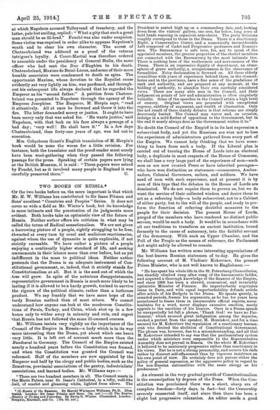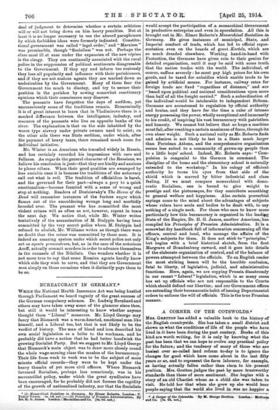TWO BOOKS ON RUSSIA.*
OF the two books before us, the more important is that which Mr. H. W. Williams has contributed to Sir Isaac Pitman and Sons' excellent " Countries and Peoples " Series. It does not cover so wide a field as Mr. Winter's book, but its knowledge is more intimate and the penetration of its judgments more evident. Both books take an optimistic view of the future of Russia. Neither author offers his criticism in what may be called the terms of Radical sensationalism. We are not given a harrowing picture of a people, rightly struggling to be free, thwarted at every turn by cruel and malicious reactionaries, against whom the use of dynamite is quite explicable, if not strictly excusable. We have rather a picture of a people enjoying a continually higher standard of life, and seeking amusements in their leisure more than ever before, but as yet • indifferent in the mass to political ideas. Neither author pretends that the Duma is an adequate instrument of Con- stitutional government, or, indeed, that it strictly stands for Constitutionalism at all. But it is the seed out of which the :tree will grow. In spite of the notorious disappointments, representative government in Russia is much more likely to be lasting if it is allowed to be a hardy growth, trained to survive the rigours of the political climate, rather than a hothouse product. We say frankly that we have more hope of the tardy Russian method than of most others. We cannot understand how anyone can look at the mushroom Constitu- tions of Persia, Turkey, and China, which shot up in a few hours only to wither away in calamity and ruin, and regret 'that Russia has not followed the same ill-omened courses.
Mr. Williams insists very rightly on the importance of the --Council of the Empire in Russia—a body which is in its way • more interesting than the Duma, yet about which one bears
• very little. It is left out of account much more than the Bundesrat in Germany. The Council of the Empire existed nearly a hundred years before the Constitution was framed,
• and when the Constitution was granted the Council was reformed. Half of the members are now appointed by the Emperor• and half by the clergy and public bodies, such as the • Zemstvos, provincial associations of the gentry, industrialists' associations, and learned bodies. Mr. Williams says
There are two hundred members in all. The Council meets in • the Marie Palace, near St. Isaac's Cathedral, in a lofty, well-like -hall, of scarlet and gleaming white, lighted from above. The
a (1) Suasiu of the Russians. By Harold 'Whitmore Williams, Ph.D. Mow tented. London: Sir Isaac Pitman and Sous. tee. net.1—(2) The Roman „Ramiro of To-day and Yegarday. By Nevin 0–Winter. Illustrated. London Simpkin, Marshall, and Co. [10. 6d. net.] President is seated high up on a commanding dais, and, looking down from the visitors' gallery, one sees, far below, long rows of bald heads reposing in capacious arm-chairs. The party divisions roughly correspond to those in the Dutna. There is a reactionary Right, a Conservative Centre, and a numerically inconsiderable Left composed of Cadet and Progressive professors and Zemstvo men. The Bureaucracy is safe here, for, not to speak of the appointed members, the greater proportion of the elected members are connected with the Bureaucracy by the most intimate ties. There is nothing here of the restlessness and nervousness of the Duma. There is an impressive dignity of deportment, an atmo- sphere of grave authority, a scrupulousness in the observance of formalities. Noisy declamation is frowned on. All these elderly councillors with years of experience behind them, in the chancel- leries and in the provinces, have a fine sense of the gradations of rank and authority, and are prepared at any moment, at the bidding of authority, to abandon their own carefully considered views. There are many able men in the Council, and their judgment on points of law and administration is of ten singularly valuable. Some of the speeches in the Council attain a high level of oratory. Original views are presented with exceptional cogency, subtlety of argument, and wealth of illustration. Only the net result of these stately debates is that reforms are simply decorously buried. The Council may waver and, on occasion, indulge in a mild flutter of opposition to the Government, but in the end it nearly always does as the Government wishes it to."
No doubt the Council of the Empire is in its last expression a. subservient body, and yet the Russians are wise not to lose the experience of administrators gathered from every part of the Empire. We cannot help thinking that we have some- thing to learn from such a body. If the Liberal plan is carried out of turning the House of Lords into an electoral body, a duplicate in moat respects of the House of Commons, we shall lose a very large part of the experience of men—such men as are now created Peers or have inherited peerages— who have won distinction as statesmen—commoners, Ambas- sadors, Colonial Governors, sailors, and soldiers. We have need of men with such experience, and at present it is by men of this type that the debates in the House of Lords are dominated. We do not require them to govern us, but we do want the service of their collected wisdom and desire them to not as a referring body—a body subservient, not to a Cabinet of either• party, but to the will of the people, and ready to per- form the function of referring doubtful measures to the people for their decision. The present House of Lords, purged of the members who have rendered no distinct public service, would be such a body. It would be in accordance with all our traditions to transform an ancient institution, bound formerly to the cause of autocracy, into the faithful servant of the democracy. With such an Upper Chamber, and the Poll of the People as the means of reference, the Parliament Act might safely be allowed to remain.
Mr. Williams has written some interesting appreciations of the best-known Russian statesmen of to-day. He gives the following account of M. Vladimir• Kokovtsev, the present Prime Minister, who is not well known to Englishmen :—
" He has spent his whole life in the St. Petersburg Chancelleries, has steadily climbed rung after rung of the bureaucratic ladder, and acquired a thorough knowledge of the finances of the Empire, and since 1906 has been a shrewd, economical, and invariably optimistic Minister of Finance. He imperturbably negotiates loans in Paris, and with equal imperturbability defends article after article of his Budgets in the Duma. Ho speaks quietly, in rounded periods, frames his arguments, as he has for years been accustomed to frame them in innumerable official reports, never hesitates for a word, never displays excessive emotion, rarely appeals to the emotions of his hearers. Once in a Dams speech he unexpectedly let fall a phrase, Thank God ! we have no Par- liament,' which aroused great indignation among the deputies, evoked a protest from the speaker, M. Homiakov, and for a time secured for M. Kokovtsev the reputation of a reactionary bureau- crat who desired the abolition of Constitutional Government. The phrase was, however, due to a misunderstanding, and all that M. Kokovtsev intended to say was that the parliamentary system under which ministers were responsible to the Representative Assembly does not prevail in Russia. On the whole M. Kokovtsev is believed to be cautiously progressive rather than reactionary in his views. But he is not a strong personality, and secures his ends rather by discreet self-effacement than by vigorous insistence on his own point of view. He certainly does not pursue either the policy of general repression, or the aggressive policy in regard to the non-Russian nationalities with the same energy as his predecessor."
An element in the very gradual growth of Constitutionalism is the emancipation by degrees of the Press. When the Con- stitution was proclaimed there was a short, sharp era of complete freedom—forty days, in fact—but the Censorship severely reasserted itself, and since then there has been a slight but progressive relaxation. An editor needs a good ideal of judgment to determine whether a certain criticism will or will not bring down on him heavy penalties. But at least it is no longer necessary to use the absurd paraphrases by which forbidden ideas were formerly indicated. Conatitu- tional government was called "legal order," and " Marxism " was permissible, though "Socialism" was not. Perhaps the class most ill at ease under the expansion of the new regime is the clergy. They are continually associated with the rural police in the suppression of political sentiments disagreeable to the Government. If they spy and inform too zealously they lose all popularity and influence with their parishioners, and if they are not zealous agents they are marked down as undesirables by the Government. Many of them fear the Government too much to disobey, and try to secure their position in the parishes by sowing somewhat reactionary opinions which their consciences may disavow.
The peasants have forgotten the days of serfdom, yet unconsciously some of the traditions remain. Economically it is of great interest to learn that in Vladimirovo there is a marked difference between the intelligence, industry, and resource of the peasants who live on opposite banks of the river. The explanation is that on the aide inhabited by the worse type slavery under private owners used to exist; on the other aide there was State serfdom, under which, after the, payment of heavy taxes, there remained much room for individual initiative.
Mr. Winter is an American who travelled.widely in Russia, and has certainly recorded his impressions with care and fullness. As regards the general character of the Russians, we .believe his conclusion is just—that they are kindly and anxious to please others. When their good qualities are swamped by Jess amiable ones it is because the traditions of the autocracy call out what is evil. The tradition of officialdom is harsh, And the governed for their part--always a prey to a quick .emotionalism—become frenzied with a sense of wrong and ,stop at nothing. Headers of Dostoievsky's The House of the .Dead will remember instances of the furious anger which tames out of the smouldering wrongs long and morbidly -brooded over. The peasant who has . committed the most violent crimes will as often as net, however, repent in tears the next day. We notice that, while Mr. Winter -writes tentatively of the assassination of M. Stolypin having been committed by the very secret police whom M. Stolypin bad refused to abolish, Mr. Williams writes as though there were no doubt that the crime was committed by these men. It is indeed an amazing system under which secret police not only act as agents provocateurs, but, as in the case of the notorious .Azet actually commit murders in order to advance themselves in the counsels of the Nihilists. One wonders whether it is not more true to say that some Russian agents hardly know which side they wish to serve, and that they are Government men simply on those occasions when it distinctly pays them to be so.



























































 Previous page
Previous page